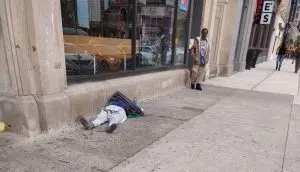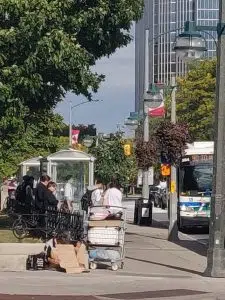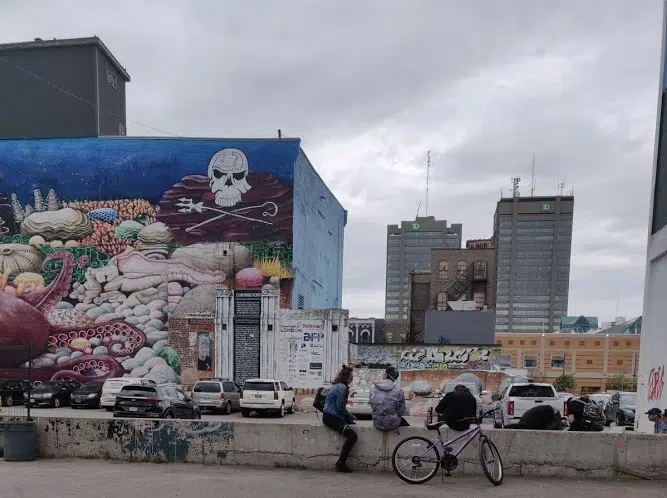“It’s my birthday today, I just turned 19 and bought this dress at the Salvation Army” says Jarrah, a teen who has been homeless since she was 15 years of age.
Homelessness in London has increased over the past few years to a point where it is being considered an epidemic crisis. Along with that, we have seen more teens and youth that are homeless now than ever before.
Jarrah says, “I have been homeless on and off because my home life growing up wasn’t the greatest. I left when I was 15 and went back home after a few months, after that my mom kicked me out and I never went back”. Teens and youth leave home for several reasons, ranging from bad home life, schooling and relationships with their parents. About 40%-50% of homeless youth and teens identify as a part of the LGBTQ+ community and most of them are abused in some form at home for it.
 Donna Atkinson Wilson, the founder of Keeping Kids Warm in London says, “I met a young man on the street who was abused by his father for being gay. When I met him, he was terrified of me but he confided in me after two weeks of giving him food and some clothes to wear. I managed to get him housed with some people I knew in the gay community and he’s in University now.”
Donna Atkinson Wilson, the founder of Keeping Kids Warm in London says, “I met a young man on the street who was abused by his father for being gay. When I met him, he was terrified of me but he confided in me after two weeks of giving him food and some clothes to wear. I managed to get him housed with some people I knew in the gay community and he’s in University now.”
Mrs. Wilson started Keeping Kids Warm over 17 years ago when she saw that there were no services or support systems for youth that are homeless. Wilson says the reason for this is because most teens are invisible in the community. “They hide because they are scared of getting caught by the cops or anyone else”.
Being homeless as a teen is a very different experience as it is as an adult. “Adults know where to go, they know the services where they can get food and clothes but these kids are scared to ask for help.” 76% of youth experiencing homeless in London have been through some form of trauma either from the judicial system, education or just their parents at home.
Jarrah says, “Even though I’m homeless and it sucks, I’ve found a community of people who go through the same thing. We all are going through pain and we have each other’s back so I find comfort in that”. 
Teens under the age of 16 are considered minors and most shelters don’t accept youth under the age of 18, so they end up living under bridges or away from the city.
“Teens don’t want to be in group homes or the foster system because they’re abused and hurt”, Sarah Askew, the founder of urban Village.
“Teens are very vulnerable and our boys and girls are at the risk of sex trafficking and prostitution when they are out on the street.”
Sarah Askew is building the Urban Village that is accepting of all youth so they can feel safe and have a bed to sleep on without worrying. “We only have about 3-4 weeks after a teen becomes homeless to help them before they start with drugs or alcohol.” says Askew.
Urban Village operates on a three stage system, first step is a safe space where teens can shower, sleep, eat and take care of any medical needs, step two involves living in the Urban Village or in one of the places associated with Urban Village and step three would be designing homes for themselves and work with engineers to build the house. They will own the land where they can grow their own food and have access to the internet so they can do online schooling. This is to build a sense of community and regain the dignity they might have once lost.
Teens that are homeless often stay homeless as adults and die homeless as well. “We are trying to stop the vicious cycle and give them an opportunity to never be homeless again” Sarah Askew said.
Services and supports like Keeping Kids Warm and Urban Village are both self-funded and has no funding from the city at all.
Councilor Elizabeth Peloza of Ward 12 says that the city is asking for help from their provincial partners. “Affordable and rent geared housing is a big part to the puzzle when it comes to homelessness as well as most people have mental health and addiction issues.”
Possible solutions involves looking into homes and owners who are willing to rent out their garages or backyards to build a shed or some small unit which can then be rented out. This can be profitable to both homeowners and the homeless.
Councilor Peloza is sympathetic to the issue who has experienced homelessness first hand. “In the early eighties when I was 3, I thought we were camping all summer but little did I know that we were homeless and living in a camper in the back of a pickup truck. My dad was being laid off from work and most of my early childhood was spent moving place to place”.
Most teens don’t identify themselves as homeless because they are either couch surfing or living with their friends in their basements.
Jarrah says, “Don’t judge everybody that’s homeless and just because they’re homeless doesn’t means they have addiction or mental health issue. You don’t know everybody’s story and most importantly, we are humans, we are all still real people, we are homeless and it’s something we are experiencing but that’s not who we are.”












